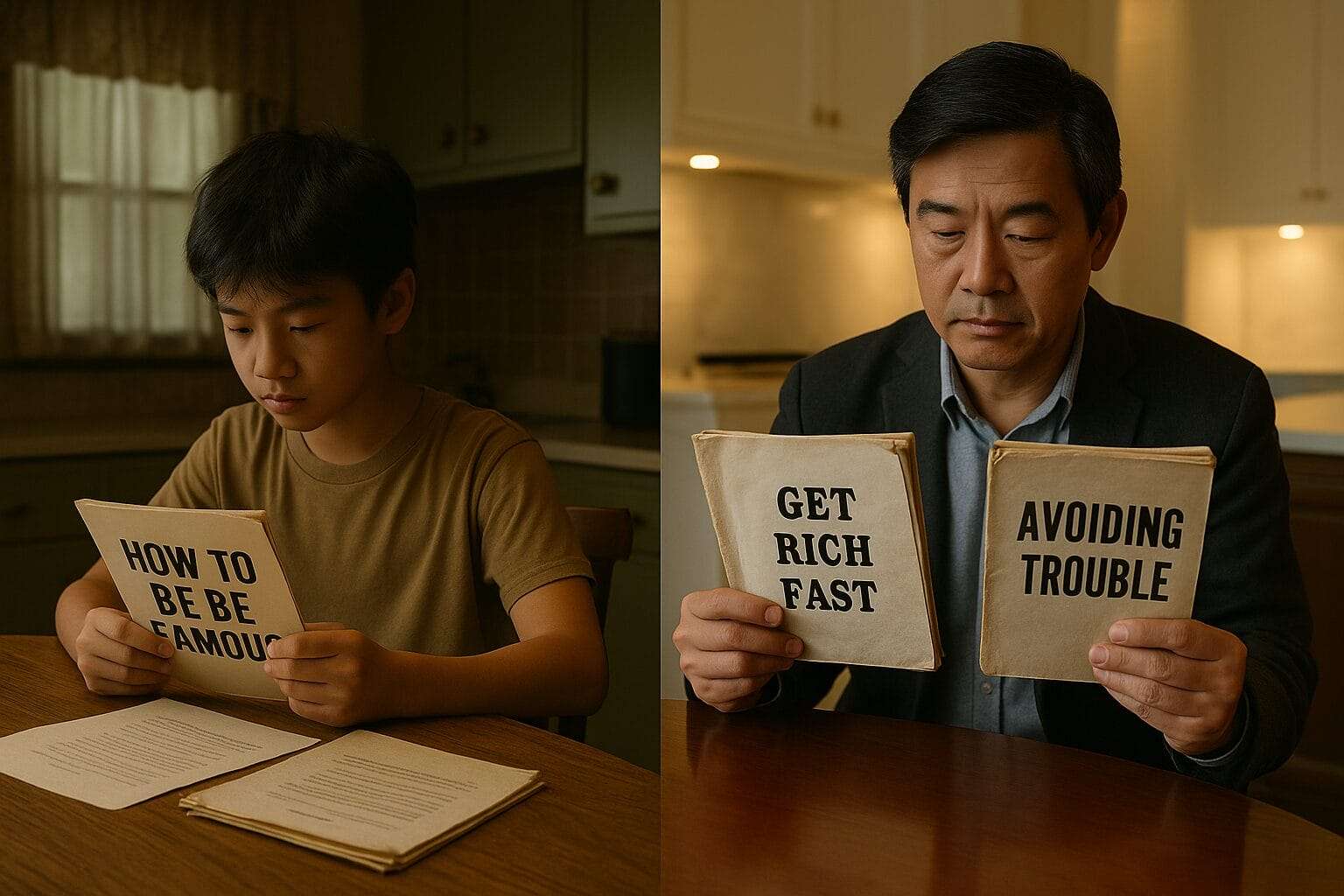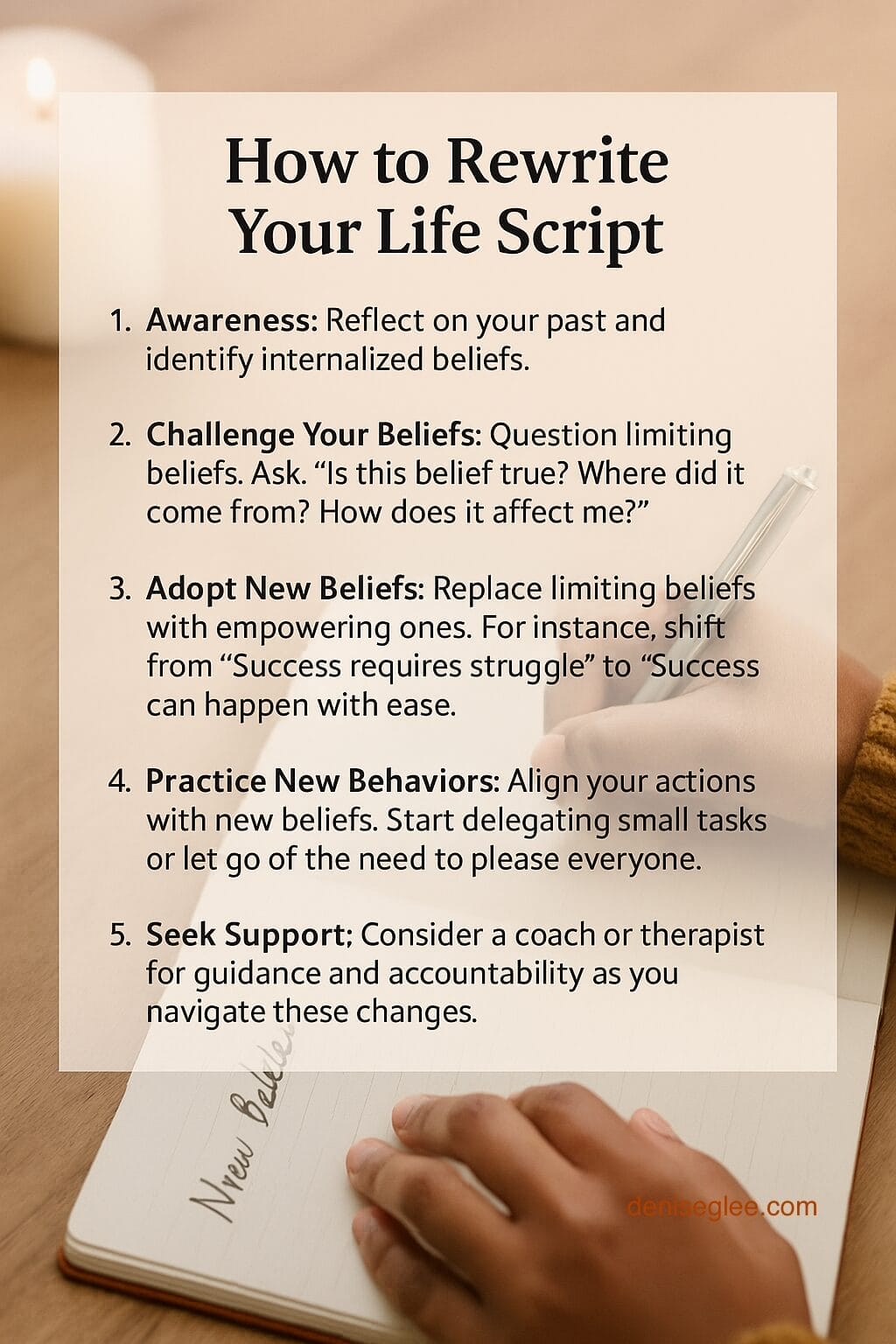
How to Break Free From Your Scripted Life (and Rewrite It With Intention)
- Updated: July 25, 2025
I once met someone who had everything a career could offer—status, money, admiration. On paper, he’d won. But inside? He couldn’t feel a thing. The milestones, the trophies, the applause… none of it reached him.
He’s not alone. So many high achievers—athletes, leaders, public figures—spend years chasing someone else’s dream. Maybe it’s the vision their parents set for them. Maybe it’s a quiet rebellion against that vision. Either way, they don’t see how deep the rabbit hole goes until the emptiness catches up with them.
That’s what a life script is: an invisible storyline written in childhood, shaped by family dynamics, cultural expectations, and survival instincts. You didn’t choose the plot, but you’ve been acting it out all along. Some parts of that script helped you achieve, but others have quietly drained the joy and meaning from your success.
The good news? You can rewrite it—not with fluffy affirmations or toxic positivity, but by naming the patterns driving you and choosing a path that feels like yours.
In this post, we’ll break down the life script formula and why it matters—for your leadership, your relationships, and your peace of mind. If you’re ready to stop performing a role you never auditioned for, let’s begin.
Jump to What Matters Most
What Is a Life Script?
A life script isn’t just “the way you were raised.” It’s the quiet, unspoken code that tells you who you’re allowed to be—and who you can’t.
It’s the reason you keep grinding even when you’re exhausted. The reason you can’t rest without guilt. The reason achievements feel hollow, as if you’re living someone else’s life.

Your script was written long before you knew what a “career” or “success” even meant. It’s made of family dynamics, cultural expectations, and the subtle messages you absorbed as a child—things like:
“Be strong.”
“Never complain.”
“Don’t outshine anyone.”
“Be good, or you’ll be alone.”
You didn’t choose these rules, but they’ve been running the show ever since.
The concept of life scripts comes from psychology, especially the work of Eric Berne, who found that we form unconscious storylines in childhood based on the messages we receive. Sometimes they’re blunt (“You’ll never amount to anything”), but more often they’re implied—like watching a parent shrink themselves to keep the peace or grind themselves into the ground to be “enough.”
If left unexamined, those early storylines quietly dictate every choice you make—who you love, how you lead, what you chase, and what you avoid.
Toxic relationships don't happen by accident.
— Denise G. Lee (@DeniseGLee) September 3, 2024
Nope.
Lots of us want to recreate the same painful feelings we received from our parents or caregivers.
Just because it was normalized to us as a child, doesn't make it healthy for as adults.
Why It’s Running Your Business—and Your Life
Your life script isn’t just personal—it’s operational.
It shapes how you lead, hire, delegate, spend, and even love. What you learned about money, control, success, and worth as a kid doesn’t stay locked in the past—it quietly scripts your boardroom decisions, your parenting, and your relationships.
I’ve worked with high-achievers who’ve built empires… still running on survival mode. Some hoard resources “just in case,” while others chase every shiny tool or course, hoping to avoid being “caught unprepared.” One leader even admitted he didn’t want to sign up for my free content because he didn’t want to “owe” anyone anything.
That’s not strategy. That’s scripting.

How It Shows Up in the Office (and at Home)
1. Nobody Can Do It Like Me
If you were praised for being the reliable one—the fixer or overachiever—your adult leadership style might look like this:
You micromanage because you don’t trust anyone’s standard but your own.
You secretly resent your team but refuse to delegate.
You don’t know how to rest without guilt.
Read: You Learned to Handle Everything—Now You Don’t Know How to Stop to understand why over-functioning isn’t leadership—it’s survival mode in disguise.
2. Scarcity Mode
If you grew up around financial stress, you may overthink every investment—or overbuy everything “just in case.” You’re not making clear strategic moves; you’re trying to soothe old fears.
Read: Breaking the Provider Trap for a deeper read on money and worth.
3. Emotional Avoidance
You can handle a business crisis in five minutes flat but freeze when an employee brings up burnout or personal struggles. If emotions were dismissed or dangerous in your home growing up, you’ll unconsciously avoid them now. This doesn’t just affect your team—it affects every relationship.
Read: Price of Conflict Avoidance to see how emotional avoidance spills into your personal life.
4. Parenting Your Team
You’re not leading—you’re “raising” adults who don’t need another parent.
Read: Stop Parenting Your Employees for specific signs and fixes.
The Science Behind Life Scripts
You don’t have to burn sage or meditate on a beach to know something’s off.
Some of us are so entangled in our old scripts that dissociation becomes second nature. We drift out of conversations. We check out during meetings. We numb with snacks, scrolling, or “just one more email.” It’s not laziness—it’s survival mode.
And your brain? It remembers everything you’ve ever done to stay safe.
This isn’t just a personality quirk—it’s wiring.

How the Past Programs Your Present
Cognitive-behavioral theory tells us that thoughts, feelings, and behaviors form a closed loop. The beliefs you absorbed as a kid—“I have to be perfect,” “I can’t need help,” “I’m too much”—don’t vanish when you grow up. They become the filters for how you lead, love, and handle stress.
One landmark study, the ACE (Adverse Childhood Experiences) study, proved what many of us already feel in our bones: early wounds like neglect, abuse, or chaos leave imprints that shape everything from emotional patterns to physical health. These aren’t vague habits—they’re neural grooves your brain has been running on autopilot for decades.
Too many of us are STUCK in an infantile or childlike state.
— Denise G. Lee (@DeniseGLee) August 17, 2024
And then wonder why we are so unhappy in life.
We want someone we admire to encourage or inspire us into action.
Maybe, just maybe, you need to be your own hero and inspire yourself into action.
Your Brain Can Change—But It Won’t Do It for You
Here’s the good news: your brain is plastic. Neuroplasticity means you can rewire old scripts by consistently choosing different thoughts, reactions, and behaviors. Think of it as updating your mental operating system.
Every time you pause instead of people-pleasing, every time you challenge the belief that “rest is lazy,” you’re building new neural pathways. Over time, these small choices become the new default—your new script.
As neuroscientist Dr. Joe Dispenza explains, focused and repeated mental shifts literally change the way your brain fires and connects. This isn’t woo-woo. It’s biology.
You’re not broken. You’re rewritable.
Next, let’s talk about how rewriting your script shifts everything—from how you lead under pressure to how you show up in your closest relationships.
Why Rewriting Your Script Changes Everything
Once you understand how your brain wires your story, the real question becomes:
Where is this script still running your life—and costing you?

In the office: It shows up as emotional disconnection, micromanaging, or “parenting” your team instead of leading. (Read Emotional Disconnection in Leadership, Emotional Sobriety for Leaders, or How to Discipline an Employee Respectfully to dive deeper.)
In your relationships: It shows up as over-giving, avoiding conflict, or choosing partners who repeat old wounds. (See How Codependency Disguises Itself for a deeper look.)
In your body: It shows up as burnout, tension, and stress that refuses to stay in “the office.” (Read What Stress Does to Your Body and Business for how over-functioning leaves a mark you can’t ignore.)
The cost of staying on autopilot isn’t just emotional—it’s operational. It affects how you lead, how you love, and how your body holds the pressure.
But here’s the good news: rewriting your script doesn’t just shift how you feel inside. It transforms how you show up everywhere.
How Rewriting Your Script Changes How You Lead, Love, and Handle Pressure
Rewriting your script isn’t just about feeling “better.” It’s about shifting the invisible patterns that dictate how you operate when things get hard—at work, at home, and even in your own head.
When you start living from a new script, here’s what changes:

1. You Lead With Clarity—Not Survival Mode
Leaders who haven’t examined their life scripts often operate like firefighters—reactive, controlling, and emotionally distant. Once you rewrite your script, you stop leading from fear or over-functioning and start creating systems that actually work.
You become the leader who can set firm boundaries, hold space for hard conversations, and make decisions without the old panic of “what if I fail?”
2. You Love Without Re-Enacting Old Wounds
Your relationships—romantic or otherwise—are mirrors for your script. If your childhood taught you to earn love or silence your needs, you’ll play that out with your partner, friends, or colleagues.
Rewriting your script means you stop confusing chaos with chemistry. You learn to name your needs, set boundaries, and build relationships that don’t feel like emotional minefields.
3. Your Body Stops Carrying the Weight Alone
Every script you don’t address ends up living in your body—through tension, chronic stress, and exhaustion that no “self-care day” can fix.
Rewriting your script calms the nervous system. It gives you permission to rest without guilt and respond without the constant adrenaline spike of survival mode.
These 30 Questions Reveal the Script Running Your Life
You want to change—but do you really know what’s driving you?
Uncovering your life script doesn’t start with a lightning-bolt breakthrough. It starts with reflection—honest, unfiltered, sometimes uncomfortable reflection. The simplest questions, when answered truthfully, reveal the hidden rules you’ve been living by for years.
Here are a few categories from my Life Script Questionnaire, with sample prompts to help you trace the emotional blueprint shaping your decisions today:

1. Stress & Survival Patterns
🧠 When you’re under stress, what’s your first move?
Do you shut down? Lash out? Pretend everything’s fine?
Your automatic responses aren’t random—they’re coping mechanisms learned early, often unconsciously, from the people who shaped you.
2. Childhood Rules
🌟 As a kid, what made you feel valued—your grades, your toughness, your silence?
The early feedback you received taught you what to chase in order to feel “worthy.” That blueprint still echoes in how you seek validation—whether through career milestones, relationships, or social media applause.
3. Emotional Safety
💬 Could you safely express your feelings with your parents or caregivers?
If vulnerability or emotional honesty felt risky, it’s no surprise it still feels uncomfortable now. This avoidance often drives how we handle conflict, intimacy, or even team dynamics at work.
4. Self-Worth & Control
What parts of you were celebrated—and which parts were criticized or ignored?
Where do you feel you need to “earn” love, rest, or success?
These questions unearth the control mechanisms you’ve built to feel safe or accepted.
5. Leadership & Relationships
Do you believe it’s easier to “just handle it yourself” rather than delegate or ask for help?
Do you find yourself repeating the same relationship patterns, no matter who’s across from you?
These answers reveal how your personal script seeps into your professional and personal life.
When I review someone’s responses, I don’t just see data—I see storylines. I see the hidden drivers behind perfectionism, control, numbness, fear of rest, and even fear of success.
Looking at your script takes courage—not just because it’s painful, but because a part of you still depends on it.
The reward? Clarity. Not the superficial kind that promises ten quick fixes, but the deeper clarity that lets you stop running from your own truth.
You can’t rewrite what you refuse to face.
And you don’t have to face it alone.
Too many of us have been trained in certain "oughts, musts or must nots."
— Denise G. Lee (@DeniseGLee) September 15, 2024
Maybe we had parents who gave us some really unrealistic standards that we think we should uphold. Cancel these thoughts.
You should be allowed to think and feel in a way that makes sense for you.
Real Life Scripts in Action (and What to Do About Them)
It’s one thing to understand your script on paper. It’s another to see how it shows up—every day—in your decisions, your leadership, and your inner dialogue.
Here are just a few common patterns I’ve seen again and again in high-achieving professionals:

🔁 The “I Have to Prove Myself” Script
If your childhood was full of gold stars, performance charts, or subtle pressure to be “the achiever,” you probably learned early on: worth equals output.
Now, you’re running a business, climbing the ladder—or both—and wondering why it still never feels like enough. You hit goals, then immediately raise the bar. Rest feels unsafe. Burnout feels inevitable.
🙈 The “Avoid All Conflict” Script
When home wasn’t emotionally safe—maybe silence, shame, or explosive anger met every disagreement—you likely learned that conflict equals danger.
So now, hard conversations with team members, vendors, or clients feel like landmines. You stay quiet to “keep the peace,” but resentment simmers and boundaries blur. That avoidance? It’s the script talking.
😔 The “I’m Not Enough” Script
This one runs deep.
If you were criticized, ignored, or forced to earn affection as a child, you may carry the hidden belief that you’re fundamentally lacking. It can look like perfectionism. Imposter syndrome. Sabotaging your own momentum. Or playing small when it’s time to lead big.
You don’t just “grow out” of these patterns.
You have to unlearn them—intentionally, repeatedly, with support.
That’s exactly what I talked about with Rev. Randy in our recent conversation on his podcast Produce on Purpose. We unpacked how old scripts run silently in the background of our businesses—and what it takes to rewrite them without losing your edge.
How to Rewrite Your Life Script
Let’s be real—some of your scripts have been running the show for decades. You don’t just flip a switch and become someone new. But change is absolutely possible with consistency, curiosity, and a willingness to question the rules you’ve lived by.
Here’s where to begin:

1. Awareness: Catch the Script in Motion
Start by noticing the micro-moments:
When do you second-guess yourself, even when you know your stuff?
When do you over-deliver to prove your worth?
When does a compliment make you squirm?
These aren’t quirks—they’re clues. Every reaction reveals something about the beliefs you’ve been carrying. Awareness isn’t just the first step—it’s the doorway out.
Watch your language too. The words you speak (and think) often echo the emotional contracts you made long ago. If this part is hitting home, I highly recommend my Amazing Attitude course, where we go deeper into rewriting your internal dialogue.
👉 [Click here to access the course.]
2. Challenge the Beliefs You’ve Outgrown
Once you’ve identified a limiting belief—like “I’m not enough,” or “If I don’t stay in control, everything will fall apart”—pause and ask:
Is this actually true?
Who taught me this?
What’s it costing me to keep believing it?
You’re not trying to shame your past—you’re trying to free your future.
3. Adopt New, Emotionally True Beliefs
Don’t just drop the old belief. Replace it with something that feels both empowering and believable.
Instead of: “I have to earn love by being perfect,”
Try: “I’m allowed to be human. Love isn’t a reward—it’s a birthright.”
Instead of: “If I rest, I’ll fall behind,”
Try: “Rest helps me lead with clarity, not burnout.”
These aren’t affirmations—they’re anchors.
4. Practice New Behaviors (Even If It Feels Awkward at First)
Start small. If your old script says you can’t trust anyone, try delegating a single task. If it says you’re not allowed to take up space, speak up once in a meeting. Repetition rewires. It’s not about doing it perfectly—it’s about doing it differently.
5. Get Support—Because This Is Brave Work
Rewriting your life script is emotional labor. You’re not just changing habits—you’re releasing the stories that shaped your identity.
You don’t have to do this alone. A coach, therapist, or aligned mentor can help you stay grounded as you stretch beyond the old rules.

🎓 Be Part of the Research
If this article hit home for you, you’re not alone.
I’m conducting a research study on how life scripts shape our emotional patterns, leadership habits, and relationship dynamics.
It’s anonymous, takes less than 5 minutes, and your voice could help shape future tools for people on the same healing path.
💛 Click here to take the Life Script Study
Thank you for being part of something real.
Frequently Asked (and Silently Wondered) Questions About Life Scripts
If you’ve gotten this far, you’re probably having some “wait… is this me?” moments. That’s a good thing. Let’s dig into a few common questions people have once they realize they’re living a script they didn’t choose.
What if I don’t know what my life script is yet?
That’s normal. Your script reveals itself through repeated patterns—how you handle conflict, stress, relationships, and self-doubt. Start by noticing what feels automatic or exhausting.
Can I have more than one life script?
Yes. You might run different scripts in different parts of your life—like one for work (“I must achieve to be worthy”) and another for love (“I must fix people to be needed”).
Is it too late to change my life script?
Absolutely not. Neuroplasticity proves your brain can change at any age. The real question is: are you ready to do the work?
What if rewriting my script makes people in my life uncomfortable?
It probably will. Growth threatens the status quo. But if the old script was built on self-abandonment or survival, your healing is worth the discomfort it may cause others.
Where do I start?
Start by taking my life script questionnaire—and be honest with yourself. It’ll give you clarity on the patterns running your life. From there, decide if you want to do the work solo, with a coach, or alongside trusted support.
Your Next Chapter Starts Here
There’s nothing light about rewriting your life script.
It’s disorienting. It’s humbling. And it can feel like losing part of yourself—especially when those old patterns once kept you safe.
But the moment you name them, you shift the power.
You stop reacting and start choosing.
That’s where real change begins.
And no—it’s not linear or clean. You’ll second-guess. You’ll backslide. You’ll wonder if the old way was easier.
That’s normal.
But every time you pause, question, and move forward anyway—you’re rewriting.
Not just your mindset.
Your relationships.
Your leadership.
Your legacy.
So here’s my question for you:
What have you done—big or small—to challenge the script you were handed?
I’d love to hear.
👉 Click here to share your story.
And if you’re ready for a deeper kind of support—one that honors your truth, not just your to-do list—I’d be honored to walk with you.
🎧 Listen to the podcast
💛 Work with me 1:1
You’re not broken.
You’re becoming.





